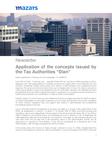
Application of the concepts issued by the Tax Authorities “Dian”
Law 1943 of 2018 - Financing Law -, repealed Article 264 of Law 223 of 1995 according to which, taxpayers who had acted based on concepts issued by the Legal Office of the National Tax and Customs Directorate (DIAN) could sustain such actions in administrative and jurisdictional venue based on the same and, that during the time such concepts were in force, the actions carried out under their protection could not be objected by the tax authorities. Likewise, the repealed provision provided that when the DIAN modified the position expressed in a concept previously issued by it, it had the duty to publish such modification in order to make it enforceable.
Instead, article 113 of the Financing Law establishes that the concepts issued by the DIAN constitute an official interpretation for the public employees of such Entity, and therefore, they will be mandatory for them; however, taxpayers may only support their actions in administrative and jurisdictional proceedings based on the law.
Let us remember that the competence to issue tax concepts is in charge of the Legal Office of the DIAN, as established in numeral 7 of article 11 of Decree 1265 of 1999, and that its binding and mandatory nature was indisputable until the repeal of the aforementioned article 264 of Law 223 of 1995. In relation to such binding nature, the Constitutional Court in Decision C-487 of September 26, 1996 stated that, although the concepts do not constitute, in principle, an administrative decision, we have that "when the concept has a self-regulating nature of the administrative activity and its requirement is imposed on third parties, it may well be considered as a decisional act of the Administration, with the legal consequences that this entails".
In the same sense, the Council of State, through a decision of July 31, 2009, indicated that "the actions of the taxpayers carried out under the protection of current concepts of the DIAN, cannot be objected by the tax authorities, since as the Constitutional Court stated 'if the Administration has indicated a criterion or orientation to the individual to proceed in a certain way, it cannot be appropriate that, contrary to its own reasons, it can disregard the action carried out by the individual protected by the conduct of the former'".
In this context, and as the jurisprudence of the Constitutional Court has held, the concepts may have the character of administrative acts when they have a normative scope, which is revealed by the obligatory nature of their application by the Administration, as becomes evident after the provisions of article 113 of the Financing Law, and by the possibility or requirement of subjection to them by the administered or taxpayers.
Therefore, the fact that the concepts that comply with the above precepts are considered as administrative acts, allows the unity of the administrative action, the uniformity of the administrative decisions, the coordination of the activities developed by the officials belonging to an administrative group, and also, the unity in the development of the policies and general guidelines outlined by the superior bodies of the Tax Administration. This is intended to comply with the provisions of Article 209 of the Political Constitution, in the sense that the administrative function is developed based on the principles of equality, morality, effectiveness, efficiency and impartiality, and thus prevent the Administration from voluntarily misleading taxpayers.
Consequently, despite the abovementioned repeal, the tax proceedings carried out by the taxpayers under the protection of concepts issued by the DIAN, should continue to constitute support in jurisdictional proceedings and even in administrative proceedings for such proceedings, in accordance with the criteria adopted by the Constitutional Court and the Council of State in relation to the nature of administrative acts that can be attributed to them. The foregoing would allow safeguarding legal certainty, legitimate trust and good faith, so that taxpayers are aware of the DIAN's interpretation of the law, thus foreseeing the possible legal consequences of their action or omission.


